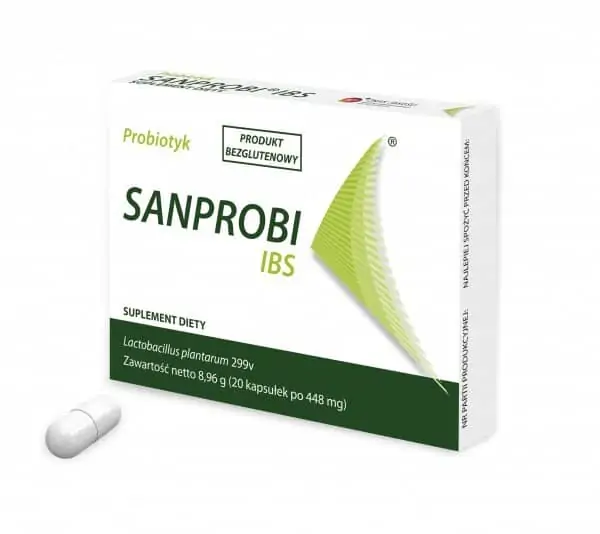

What is Calprotectin?
- Ulcerative colitis
- Calprotectin in the diagnosis of ulcerative colitis
- Irritable bowel syndrome
- Differentiating irritable bowel syndrome from inflammatory bowel disease
- Other conditions and uses of calprotectin
- Indications for testing calprotectin levels
- What is calprotectin level testing?
- Calprotectin - norms
- Take advantage of the discount
- Author
Calprotectin is a protein that is a relatively new but increasingly popular diagnostic tool in differentiating inflammatory bowel conditions and detecting irritable bowel syndrome. Testing fecal calprotectin levels allows monitoring of inflammatory bowel conditions, including differentiation of their diseases. In this article, we'll take a look at what calprotectin is, its role in the diagnosis of ulcerative colitis and irritable bowel syndrome, and how it can help in the fight against other conditions.
Ulcerative colitis
Ulcerative colitis is a chronic, recurrent inflammatory bowel disease characterized by ulcers and inflammation of the intestines. In the case of inflammatory lesions on the colonic mucosa, calprotectin is one of the elements of inflammation.
Calprotectin in the diagnosis of ulcerative colitis
Fecal calprotectin levels can be used as a non-invasive marker of ulcerative colitis activity. If the fecal calprotectin value is higher than the standard, this often indicates a greater severity of inflammatory bowel disease and may ultimately indicate the need for a change in treatment or further diagnostic testing.
Irritable bowel syndrome
Irritable bowel syndrome is a functional disorder of the intestines that manifests itself as abdominal pain, changes in bowel movements and stool disturbances. Unlike ulcerative colitis, there is no intestinal inflammation in irritable bowel syndrome.
Differentiating irritable bowel syndrome from inflammatory bowel disease
Medical diagnosis is based mainly on clinical criteria, but differentiating irritable bowel syndrome conditions from inflammatory bowel diseases can be difficult, especially when symptoms are mild. In this context, fecal calprotectin levels can be helpful as a key element in differentiating the two conditions. Low calprotectin values i.e. reaching 250 μg/g. Testing fecal calprotectin levels can help doctors make a quicker and more accurate diagnosis and guide treatment accordingly
Other conditions and uses of calprotectin
In addition to ulcerative colitis and irritable bowel syndrome, calprotectin can also be used in the diagnosis of other diseases, such as Crohn's disease and inflammatory bowel disease. In addition, calprotectin values can also be monitored to assess the effectiveness of overall treatment and response to anti-inflammatory therapy (even pneumonia).
Indications for testing calprotectin levels
Testing calprotectin levels is useful in many cases, especially in the diagnosis and monitoring of inflammatory conditions of the gastrointestinal tract, or the differentiation of inflammatory bowel diseases. Here are some situations in which it is advisable to perform this test:
I. Differential diagnosis:
Testing calprotectin levels can be helpful in differentiating inflammatory bowel diseases (such as Crohn's disease or ulcerative colitis) from irritable bowel syndrome and other functional disorders of the gastrointestinal tract.
II. Monitoring disease activity:
Calprotectin testing can be used to assess disease activity in patients with inflammatory bowel disease, allowing clinicians to evaluate the effectiveness of treatment and possibly adjust therapeutic strategy.
III. Early detection of exacerbations:
High calprotectin levels can indicate an exacerbation of inflammatory bowel disease, allowing doctors to react quickly and prevent further deterioration of the patient's condition.
IV. Monitoring the condition after surgery:
Patients who have undergone surgery for inflammatory bowel disease may benefit from regular monitoring of calprotectin levels for early detection of possible complications.
What is calprotectin level testing?
Calprotectin level testing is a laboratory analysis that determines the concentration of calprotectin protein in a patient's blood or feces. Calprotectin is a protein secreted by inflammatory cells during the inflammatory process, and its presence in the body can indicate inflammation in the intestines.
This test can be performed in several ways, the most common being:
(a) Fecal calprotectin test - the test involves taking a sample of the patient's stool and determining the concentration of calprotectin in it using specialized diagnostic tests. This is a non-invasive method that can be performed even at home.
b) Blood calprotectin test - the test involves taking a sample of the patient's blood and determining the concentration of calprotectin in it. This test is more invasive, however, it can provide doctors with additional information about the overall inflammatory state of the patient's body.
Calprotectin - norms
Calprotectin concentration standards can vary depending on the laboratory where the test is performed, as well as due to the method used to measure the level of this protein. The following are general reference values that can be taken as a guide to interpreting the results:
(a) Fecal calprotectin:
In adults: values below 50 µg/g are considered normal. Values above 50 µg/g may indicate the presence of gastrointestinal inflammation.
In children: values below 100 µg/g are considered normal, due to possible higher calprotectin values in children compared to adults. Values above 100 µg/g may suggest the presence of gastrointestinal inflammation.
(b) Blood calprotectin:
When blood calprotectin is tested, standards can vary depending on the method used to measure it. In general, values below 5 µg/L are considered normal. Results above this value may suggest inflammation in the body.
It is worth noting that the result of a calprotectin test should always be interpreted in the context of the patient's clinical symptoms, medical history and the results of other diagnostic tests. The final diagnosis and interpretation of the calprotectin test results should be made by a physician.
Summary
Calprotectin is a protein present in neutrophils (a type of white blood cell) that plays an important role in the body's inflammatory and immune processes. It is a commonly used diagnostic marker to assess the activity of inflammatory bowel diseases (IBD), such as Crohn's disease and ulcerative colitis. Calprotectin values in blood or feces can indicate the presence of inflammation in the gastrointestinal tract, and its testing is a relatively simple and generally non-invasive diagnostic tool. In addition to IBD, elevated calprotectin levels can also be present in other inflammatory conditions and intestinal infections. Although the above test is not sufficient to establish a definitive diagnosis, there is no doubt that it allows monitoring disease activity and predicting the risk of recurrence, and is also useful in assessing the effectiveness of treatment and eliminating the need for more invasive tests, such as colonoscopy.
Recommended supplements to support gut health:
SANPROBI IBS (Probiotyk) 20 kapsułek

PiLeJe Lactibiane Wzorcowy (Probiotyk) 30 kapsułek

ALINESS Maślan Sodu (Kwas Masłowy) - 100 Kapsułek Wegetariańskich
Take advantage of the discount::
Sources:
https://www.calprotectin.co.uk/about-calprotectin/
https://www.testing.com/tests/calprotectin/
https://www.healthline.com/health/crohns-disease/calprotectin-stool-test
Author:
Patryk Chodyniecki. Passionate about bodybuilding, swimming and combat sports. For over 10 years he has been practicing amateur strength sports, which he likes to combine alternately with boxing, MMA and swimming. He is also interested in broadly understood supplementation and dietetics, which he successively implements in his training.




























